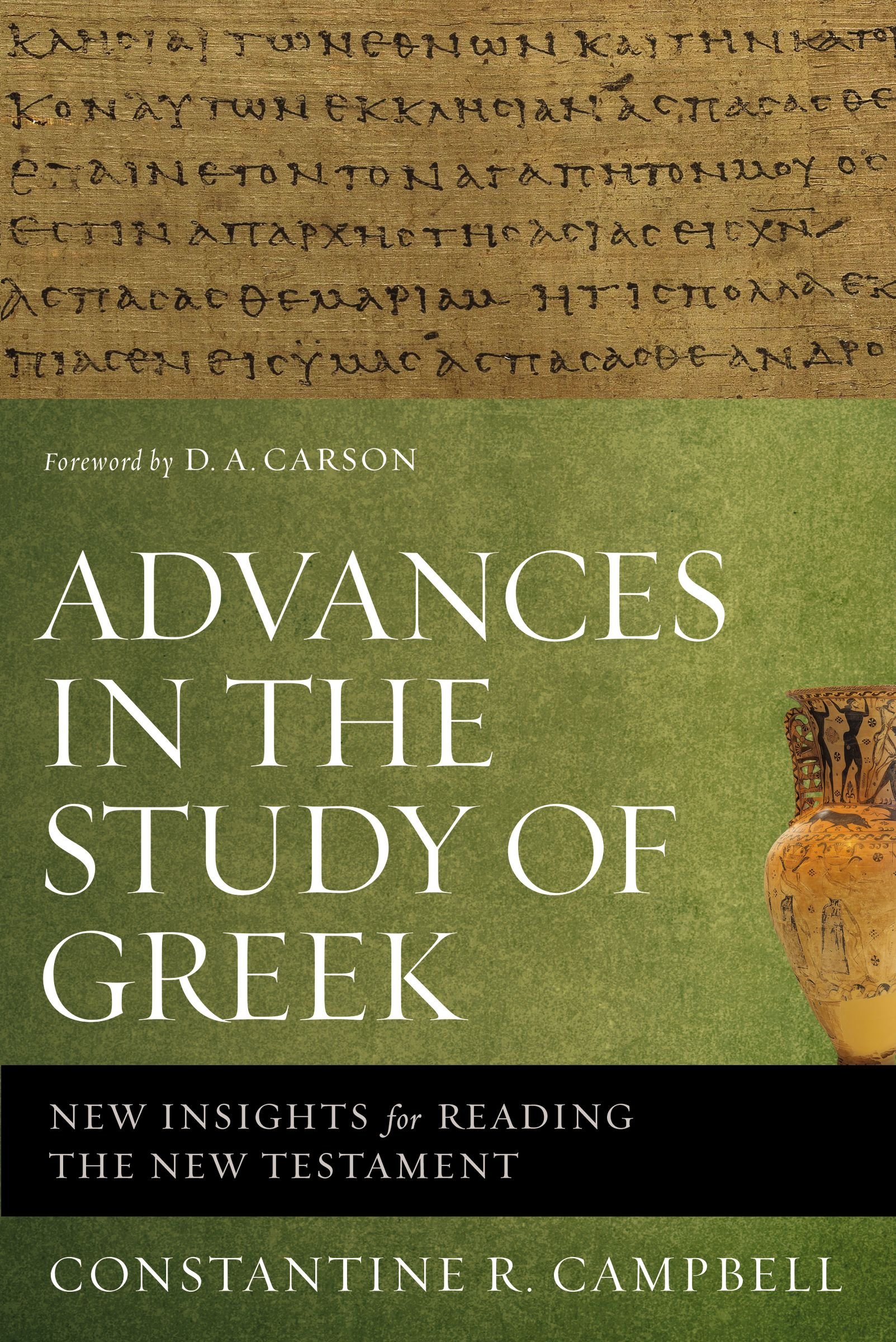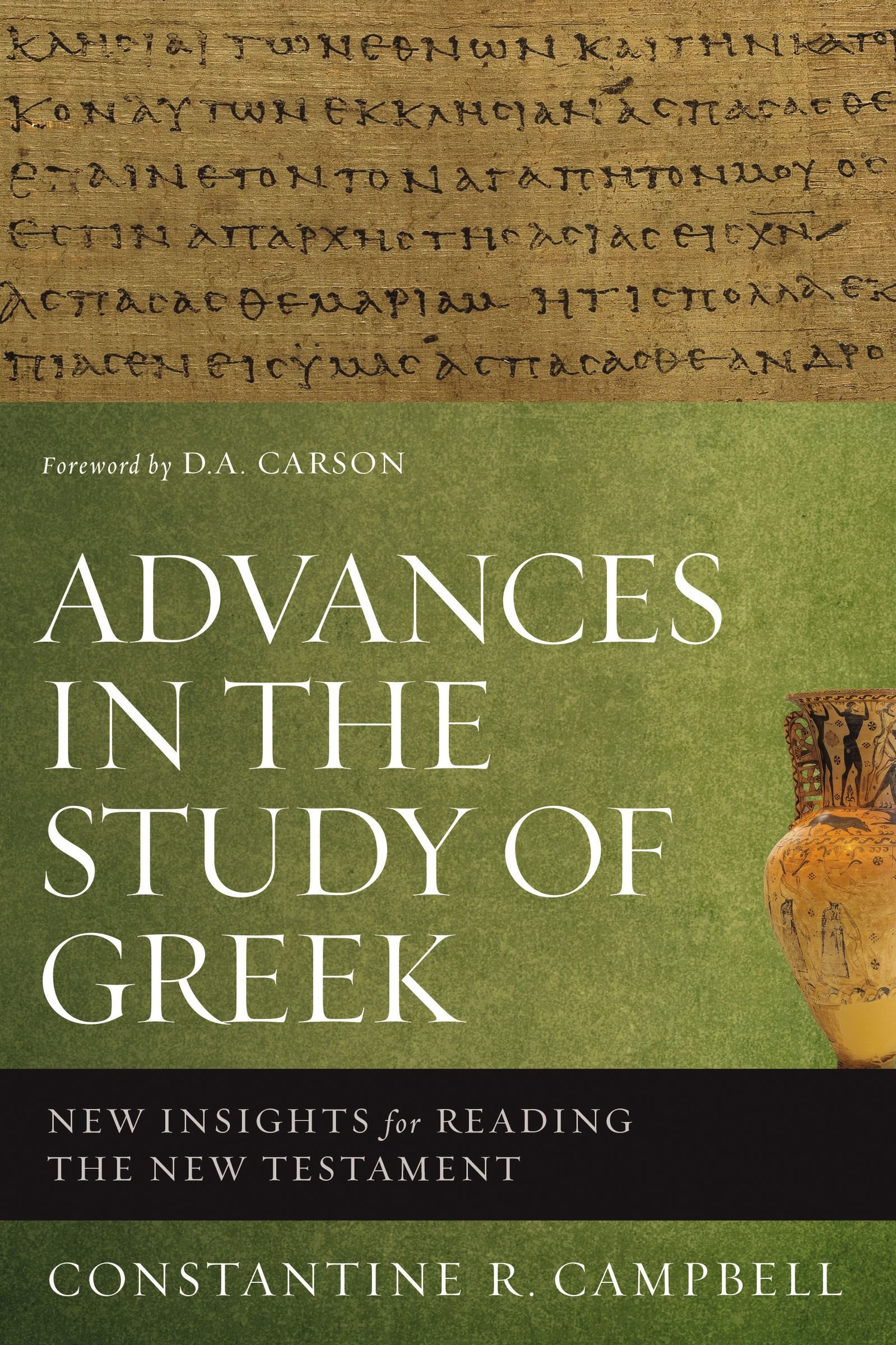 In Constantine Campbell’s latest book, Advances in the Study of Greek: New Insights for Reading the New Testament, he summarizes in two chapters the use of discourse analysis by New Testament scholars over the past few decades. A summary of these chapters and some evaluative comments might be helpful for those interested in discourse analysis.
In Constantine Campbell’s latest book, Advances in the Study of Greek: New Insights for Reading the New Testament, he summarizes in two chapters the use of discourse analysis by New Testament scholars over the past few decades. A summary of these chapters and some evaluative comments might be helpful for those interested in discourse analysis.
Halliday’s School
The first chapter gives a basic outline of different approaches to discourse analysis. He basically summarizes Stanley Porter’s 1995 article that lays out four different linguistic schools of thought and their approach to discourse analysis, along with some evaluative comments. I have also included a summary of Porter’s article in our Discourse Analysis Annotated Bibliography, so there’s no need to rehash that here.
The basic point is that the Hallidayan approach seems to have had the most influence on biblical scholars, as seen in the latest works by Levinsohn and Runge, covered in the next chapter. For this reason, Campbell then provides an overview of Halliday’s approach to discourse analysis, which is essentially the study of cohesion in discourse. Various elements signal cohesion, such as conjunction, reference, ellipsis, and lexemes (more could be added). He then gives several components of cohesion analysis, such as cohesive ties.
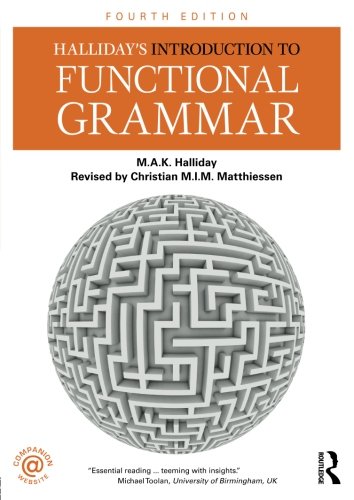 There are immense benefits to the Hallidayan approach to analyzing discourse, and many resources are already available to assist in that approach. the Louw-Nida lexicon is a great help in finding lexical cohesion, and the MadDonald’s Greek Transcriptions in BibleWorks is an easy (color-coded) tool for analyzing reference in the Greek New Testament.
There are immense benefits to the Hallidayan approach to analyzing discourse, and many resources are already available to assist in that approach. the Louw-Nida lexicon is a great help in finding lexical cohesion, and the MadDonald’s Greek Transcriptions in BibleWorks is an easy (color-coded) tool for analyzing reference in the Greek New Testament.
The difficulties with Halliday’s theories is that they are dense, require some linguistic knowledge, and in many cases hard to apply to Greek since Halliday’s theories apply to English. There are many cross-lingual features to his theory (e.g., ellipsis and logical inferences between propositions that allow for coherence), but others do not (e.g., the use of “because” in English to mean “I ask that because”). Halliday’s latest grammar, Halliday’s Introduction to Functional Grammar, is 800 pages. Any Bible student who would dare to trod through his grammar (and I hope to at some point) will be immensely enriched, not only for discourse analysis, but for exegesis in general. But whether one could make it through the dense forest of (English) functional grammar is another question. Halliday was undoubtedly the biggest influence on the Cambridge Press’ volume on Discourse Analysis by Brown and Yule from the mid-80s; this work is probably the best starting point for discourse analysis in the Hallidayan tradition.
Levinsohn and Runge
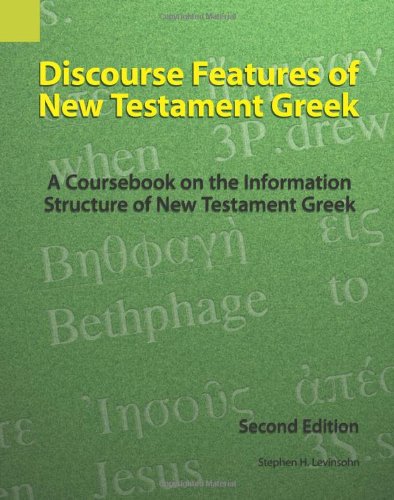
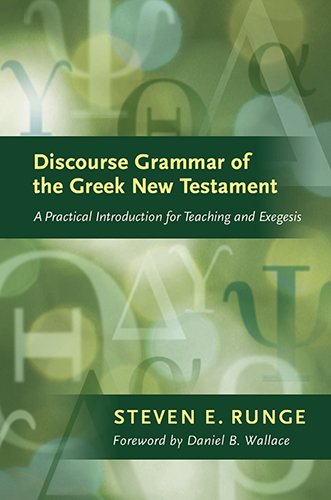 Campbell’s second chapter gives a lengthy summary of the two most recent works on discourse grammar (not analysis): Levinsohn’s Discourse Features of New Testament Greek and Steven Runge’s Discourse Grammar of the Greek New Testament. Since he summarizes them at length, there is no need for me to do so here. His basic concerns are that both works fail to go much beyond the level of the sentence, and Levinsohn’s work is admittedly (by Levinsohn) limited to certain discourse features by certain authors, an is therefore not comprehensive. The biggest problem with Runge’s volume is that it is a discourse grammar, not a volume on discourse analysis. So again there is not much useful for evaluating chunks of discourse, but more for evaluating links between clauses or verses. Runge hopes to produce a larger volume on discourse analysis, so we must await that volume to see what his full system looks like.
Campbell’s second chapter gives a lengthy summary of the two most recent works on discourse grammar (not analysis): Levinsohn’s Discourse Features of New Testament Greek and Steven Runge’s Discourse Grammar of the Greek New Testament. Since he summarizes them at length, there is no need for me to do so here. His basic concerns are that both works fail to go much beyond the level of the sentence, and Levinsohn’s work is admittedly (by Levinsohn) limited to certain discourse features by certain authors, an is therefore not comprehensive. The biggest problem with Runge’s volume is that it is a discourse grammar, not a volume on discourse analysis. So again there is not much useful for evaluating chunks of discourse, but more for evaluating links between clauses or verses. Runge hopes to produce a larger volume on discourse analysis, so we must await that volume to see what his full system looks like.
One of the main problems with both volumes is their eclecticism. They borrow freely from various linguistic schools. The problem is partially not their own fault, since no linguistic school has systematically applied their theories to the study of Koine Greek. But linguists do tend to play in packs, and attaching oneself to one school of thought might not be a bad idea for producing a theory of Greek discourse analysis. Halliday’s approach is helpful and would be as good a choice as any, but the other schools could be explored as well. Ultimately some form of eclecticism is inevitable, but too much may create a theory that is self-contradictory.
The Way Forward?
Porter said long ago that if biblical scholars want to engage in discourse analysis (as he believes they should), they will have to do serious study in linguistics. This can be daunting, since there is so much material to wade through and who knows where to start? That is one of the purposes of Exegetical Tools, though: to lead students, pastors, and scholars to the right resources, especially with our Annotated Bibliographies (which we are continually preparing and publishing – see our current bibliographies under the resource tab up top).
I might venture to suggest that any linguistic knowledge acquired will be helpful for exegesis. So while many scholars are hesitant to branch out into other fields because of today’s increased specialization (I was once told to avoid other fields so I could accomplish something in biblical studies), there should be no fear in this case. Linguistics is obviously directly applicable to biblical studies, since we deal with language continuously.
Moreover, someone needs to do the work of taking all the elements that contribute to coherence and cohesion and work them out in Koine Greek — not in NT Greek, but in Koine. Discourse analysis should extend beyond the NT Greek, which is only a small subset of Koine. Yet we must also keep in mind the various particularities about the NT that give it coherence in a way that other documents (e.g., papyri) would not have, for example, theological presuppositions and allusions to OT texts. But there is also more to discourse analysis than coherence and cohesion – these other elements would need to be decided upon and worked out systematically.
If you were to venture on this task, you could use our Discourse Analysis Annotated Bibliography and begin with Brown and Yule’s Discourse Analysis, and then venture into the world of linguistics, perhaps trying out a couple hundred pages of Halliday’s Introduction to Functional Grammar. There are plenty of articles and books on discourse analysis as applied to biblical studies in our Annotated Bibliography, and you could read through some of those to get a feel for how it might be used, while you develop some ideas of your own.
Find Campbell’s Advances in the Study of Greek here on Amazon.

